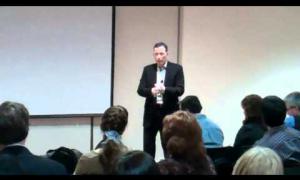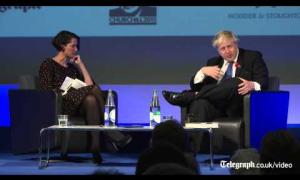Demanding, and understanding
February 22, 2017
A review of the upcoming Smithsonian Channel documentary on one fine speechwriting client: President Obama.
Let’s get this out of the way: Tonight’s Smithsonian Channel “The Obama Years: The Power of Words” is strictly hagiography.
But it’s good hagiography—artfully crafted and sincerely felt.
And it’s rhetorical hagiography—the sainting of a speechmaker who was also a speechwriter, and who seems to have been admired and beloved by the speechwriters who worked for him.
So if you’re a speechwriter yourself, this hagiography is hard not to like, despite critical-minded yourself.
In 50 minutes that fly by faster than a 20-minute talk, “The Power of Words” walks us through six major Obama speeches in such a way that each illuminates a different facet of speech creation.
Here’s what I think will interest speechwriters:
Recalling in detail and isolation the circumstances around Obama’s speech at the 2004 Democratic National Convention, one is struck anew by the sheer fact that this single speech begat a presidency. Could Obama have risen to national prominence without that speech? Well, maybe. But he’d have had to do it with another stunningly galvanizing speech. I remember a drunken conversation one night with a politically savvy Clevelander who said, “Nobody named Barack, Hussein, O’Bomber, is ever gonna be president of this country.” And he was exactly right—right up until this speech slapped America sober, all at once.
I’m not a huge fan of speechwriting war stories, but I always have wondered how “A More Perfect Union” got written—an emergency speech in the middle of a nonstop campaign. I’ve always assumed Obama wrote it himself. It’s not that simple. Obama political advisor David Axelrod and Jon Favreau tell how the speech began:
Having decided he would give a speech to save his campaign from the calamity of the release of the Reverend Wright tapes, and having rented Philadelphia’s National Constitution Center for Tuesday, Obama called Favreau on a Saturday night and for a full hour explained with lawyerly clarity, the speechwriter recalls, what it was he wanted to say.
Favreau then spent all Sunday writing, and sent the speech to Obama at about 8:00 p.m. At 3:00 a.m., he says he received a draft back “all blue” with track changes, and dominated by Obama’s own words, like “I can no more disown Reverend Wright than I can my own white grandmother,” Favreau says. “Which is not a line I would have given him—dared to give him.”
Obama campaigned all day Monday. “He went off to his room to finish the speech,” Axelrod remembers. “I went off to the bar, to worry.”
In the middle of the night Obama emailed Axelrod the final text. After reading it, Axelrod says he emailed Obama back, “This is why you should be president.”
And of course, the speech is one reason he became president.
During Obama’s presidency, a crew of seven speechwriters wrote the 3,500 speeches and remarks over eight years. And by all accounts the president managed his speechwriters well throughout.
“Any speechwriter who was working on a speech would get to meet with the president,” Favreau says here. “Because you can’t do speechwriting through a game of telephone.”
It’s moving to watch again as Obama struggles to get through his initial remarks on the Sandy Hook shooting—remarks that were missing a few deleted paragraphs that Obama told speechwriter Cody Keenan he didn’t think he could bring himself to deliver. More daunting, and also beautiful in hindsight was the speech gave eulogizing the lost children and educators in Sandy Hook. Rhetorically, that speech appealed powerfully to change gun laws, but as Doris Kearns Goodwin remarks here, the Bully Pulpit doesn’t have the power it once did.
Keenan calls the 2015 speech commemorating the March on Selma his favorite, because “the President threw himself into it,” partly during a blizzard that shut down Washington and allowed Keenan and Obama to spend a quiet day exchanging drafts of a speech that was delivered to a crowd of 20,000 by the first black president, beside civil rights icon John Lewis, before one of the most dramatic imaginable historical backdrops, the Edmund Pettus Bridge.
Keenan recalls a more difficult collaboration that led to the creation of Obama’s “Amazing Grace” eulogy at the Emanuel African Episcopal Church in Charleson. Keenan wrote for two straight days before submitting the first draft to the president, who line-edited the first two pages, crossed out the next two pages entirely, and handed Keenan three fresh handwritten pages.
Keenan apologized for not hitting the mark.
“Don’t you dare apologize,” he remembers Obama telling him. “You gave me the scaffolding I needed to work with.”
I found myself emotional throughout this documentary. Will you? Certainly you will, if you feel nostalgic for President Obama’s rise to the presidency in 2008, and if you appreciated his communication style while he was in office.
But even if you didn’t share that sensibility—if you’re a speechwriter with any experience at all, you can’t help but see President Obama as a kind of dream client: Demanding because he truly believed in the power of words as a tool of leadership, and understanding, because he knew how good speeches get written.
Good God Almighty, a leader like that comes along so rarely, for a nation—and for a speechwriter! No wonder President Reagan’s speechwriters speak of their boss this way still.




